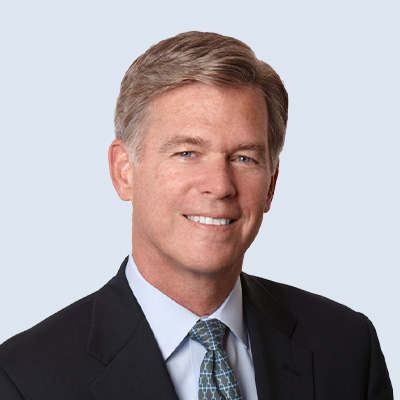Executive Interview: Deb Cupp, Microsoft
Gary Tubridy, principal at the Alexander Group, spoke with Deb Cupp, Microsoft’s president of North America, to discuss the practices of leaders and companies that produce consistent, enduring results over decades, not just years.
Deb shares what it means for Microsoft to be an enduring leadership company through their people-first mentality among their employees and customers. She also shares how to be an enduring leader within her organization.
Learn more about enduring leadership with the Alexander Group.
Gary Tubridy: Hello. Gary Tubridy, principal at the Alexander Group. And I’m here with Deb Cupp, Microsoft’s president of North America, to discuss enduring leadership, the practices of leaders and companies that produce consistent, enduring results over decades, not just years. Welcome, Deb. Thanks for joining.
Deb Cupp: Thanks. So glad to be here. How are you?
Gary Tubridy: I am great, thank you. Yeah, we’ve done some research on this subject of enduring leadership. And in that research, we’ve learned that how enduring companies actually define their mission is important. I love the Microsoft mission…powerful. To empower every person and every organization on the planet to achieve more. Yet we also know that statement evolved from a more product-centric mission statement that said, Let’s put a PC in every home. And that was a pretty good mission statement in its time. So tell me about that evolution.
Deb Cupp: Yeah. The mission worked for Microsoft for a while to put a PC in every home. But I think you it created sort of a product-centric approach and it didn’t really speak to value as to why is that good? You know, why do we care? Why does that matter both to our customers and to our people? And we went through, as many people know at Microsoft, we went through a period of being actually kind of hyper-competitive internally. And there were, although created a lot of energy, it got to a place where that isn’t a positive environment that you want to be working in. And when Satya stepped in as CEO in 2014, he really took a pause and said, I want to listen to employees, I want to listen to customers, I want to listen to partners, and I want to challenge us to challenge the whole company. And he described it as sort of rediscovering our soul. What are we doing? What are we trying to accomplish? And ultimately, the answer was one of empowerment, because it speaks to so many things. It speaks to empowering not just ourselves as people of employees of the company, but our customers, their customers and organizations around the world. And so it’s really more about building things that empower versus being so focused on the product specifically.
Gary Tubridy: Yeah. And it strikes me that when he took over, this wasn’t about him putting a stamp on the company. This is about listening to the company, listening to customers and reflecting that in a kind of an elevated tone.
Deb Cupp: That’s right. And that’s his style. I mean, he’s very much about what is good for the organization, what is good for everyone associated with it, whether that be a shareholder, a customer, an end user. It’s not about him, which I think is really important as we think about the way we work at Microsoft.
Gary Tubridy: So why is today’s mission statement, this notion of empowering every person in every organization to achieve more – Why is that so important today at Microsoft?
Deb Cupp: I think at the root of it, it’s a connection. I thought about this a lot in terms of even my own connection to the company. And I think about how it’s a mission beyond profit. It’s a mission beyond products. It’s a mission that speaks to people in a very specific way to them. So it’s a vital component of sort of what does empowerment mean to an employee? What does it mean for our customer and how do we empower a business outcome? So I think it’s an emotional connection which is very different. Creating that space to say what is your empowerment as an employee. And then how do you again, empower others? And we know we hear. Studies today will tell you, nine out of 10 people will say, I’ll earn less money in exchange to do meaningful work. And that’s important to understand that you’re doing something that’s meaningful and is creating a brand with a strong purpose and people care about brands with strong purpose. So I think for us it’s been enduring. The actual mission is enduring, which I think says a lot about how much it resonates.
Gary Tubridy: I use the Microsoft mission as an example recently in a talk where I said there’s no mention of growth in that mission, and yet you cannot achieve it if you don’t grow. But growth has a purpose. When you think about enduring leadership companies, they have strong people-first kinds of cultures. What words best describe the culture today at Microsoft?
Deb Cupp: We talk a lot about growth mindset. It’s another thing that Satya brought forth to the organization. It’s about encouraging kind of removing barriers of thoughts and ideas around being okay with the fact that you might not know. So getting more comfortable with vulnerability, pushing very hard around authenticity and empathy. We’re working very hard also on inclusivity. And it all kind of comes together in a way that really describes who we are at Microsoft right now. And I will also say, we’re really embracing flexible hybrid work because we’re thinking about the needs of our employees. So I think all of that coming together is sort of how people-first shows up for us right now at Microsoft.
Gary Tubridy: You know, I see some companies imposing – Let’s get back to the office. And this might be an opportunity for Microsoft and other companies to set themselves apart and say, hey, we might be able to do better. Let’s think about that.
Deb Cupp: Yeah. And we’re listening. Employees don’t want to be forced back to the office. It’s just not how they want to work. And so I think we have to be super careful about listening to what is creating the most productive environment for our people and how are we making sure that we’re giving them the tools and the capability to be as productive as possible in those environments.
Gary Tubridy: What, Deb, would you say are the most powerful culture of building and sustaining tools that you use?
Deb Cupp: We use surveys a lot, so we listen. I think one of the biggest pieces of feedback we can get as leaders is what are people saying. So we have pulse surveys which are really telling us that can be daily. People get the opportunity to comment whenever they want in terms of kind of how they’re feeling. We do employee signals and those are really deep surveys that give us a chance to get clarity on do they understand our direction, our Northstar, our mission? Do they feel like they are empowered and are feeling included? That type of feedback to us is incredibly powerful and it actually works its way into our management framework as we think about what we do going forward. And what I mean by that is that can be through employee resource groups where we get information. It can be through hiring practices. When we think about: are we attracting enough diverse backgrounds, are we creating enough training materials for what we call model, coach, care? That’s how we think about management. We think about it in the context of modeling, coaching and caring.
Gary Tubridy: Give me an example or two of your culture and action. How you leverage it to do some things that other companies cannot easily replicate?
Deb Cupp: Yeah, I think one of the ones that I think is so special is called the Give Campaign. And I remember when I first came to Microsoft, I thought, Wow, this is incredible. So one month a year, Microsoft matches employee giving to charitable organizations. We do it year-round, but during the month of October – so it’s coming up here shortly – we hold a series of events, fundraisers, volunteering opportunities. It’s incredible. It mobilizes the entire company. And it’s this incredible feeling just to not only watch how excited people get to give back but the dollars associated with it, the volunteer hours that we generate. It’s incredible. So I think that speaks volumes. It’s very deep to the company in terms of that give. Another one that’s really fun is called a hackathon. So it’s a multi-day global event across the company. Employees bring ideas so they in essence are creating and innovating hack ideas that inspire them. So it can be a passion project, it can be anything. And we, of course, sponsor and challenge and do all sorts of fun things to make it a really neat and unique event. So those are two really, really good examples. And then of course, our employee resource groups are super active at Microsoft. So they’re also creating communities for people, they’re educating. So I personally engage with our ERGs, our employee resource groups, all the time so I can learn how do I become a better ally? How do I coach others to be better allies? What are opportunities for us to celebrate history and experiences in different groups that can be of value to others? So those are a couple of good examples, I think, of how our culture shines through.
Gary Tubridy: You know, you hear a lot about companies losing the startup culture as they get bigger and bigger and bigger. It sounds like these are really nice tools for you to maintain that touch with everybody in the company despite the size.
Deb Cupp: Yeah. And those are global examples. So we even have things like this happening at the local level as well, which we love. So you will have different groups inside the organization that will spin up things as well that create those types of opportunities too. So it’s really encouraged for people to continue to drive and maintain that culture.
Gary Tubridy: You know, you’re a tech company. There are lots of companies that depend on technology. You hear so much about so many great things that companies do based on technology. Yet a lot of companies are realizing that, you know, the secret sauce to our greatness, particularly in an era where customers are demanding and we have subscriptions and we have to have continuous relationships with customers, they’re kind of realizing that the secret sauce is really their talent. So what words would you have to describe that secret sauce at Microsoft, your tremendous talent base?
Deb Cupp: Yeah, Gary, first I would say I couldn’t agree more. Everything is talent. It’s something I talk about constantly. It’s like nothing works if you don’t have the talent. For us, it’s people are curious, super curious. And I think that drives a lot of the opportunity to create correct questions and to be thoughtful. I think people are customer-obsessed. I think that they’re passionate and they’re eager and they’re interested. They have this desire to find ways to create solutions for problems. So it’s really kind of thinking around outcome-based, which I think is important. It’s an interesting, unique aspect of how do you take what you know and create solutions to solve problems. And we really continue to strive also as we think about the talent. We want talent that have growth mindsets and that have an inclusive perspective that really are interested in making sure that their environments are inclusive.
Gary Tubridy: Sounds like we go back to what you indicated at the outset. There might have been a product-centric view of the world some years ago. This is a solution, customer-centric view. It makes it a lot more interesting.
Deb Cupp: It sure does. I will also say it’s a journey, right? So it’s a big place. And I think we’re always learning. And back to the growth mindset. We’re on a journey and we know we’ll continue to be. But absolutely that’s the goal. How do we keep creating an outcome-based environment for people?
Gary Tubridy: So tell me a little more about how you use your mission to attract and energize and stay engaged with that talent group that you have.
Deb Cupp: Yeah, I think it’s in every job description, first and foremost. So I think as we look at even attracting talent externally as well as retaining talent, it’s really about making sure that people understand that empowerment mission and what it means. So I think what’s super important is you connect the mission to the role and the accountability of the person. That is very helpful. So people understand what is the connection for me as I think about empowerment and that can show up in many different ways depending on the role or the accountability. So that’s one I think the brand itself is an attraction partially because of the mission. So I think we’re privileged in that we are fairly well known. So I think it’s helpful for us to continue to show up consistently and that’s something that we hold ourselves accountable for. So being included in best companies to work for and things like that certainly also help attract talent. And then we work hard on making sure that we are showing people the way that we are out talking about it, that we…
Gary Tubridy: So you have to think about delivering that message.
Deb Cupp: Absolutely. You can’t expect people to know. Right. So I think a lot of us spend time making sure that we’re out sharing it, sharing the stories, having our customers share the stories, having our employees share the story. So it’s a consistent message that happens across many that interact with Microsoft.
Gary Tubridy: Yeah. Kind of continue that theme, you hear a lot about tools, digital and otherwise to help people be productive. And of course, those are very important. And yet you can’t lose sight of the fact that developing people, mentoring people, showing empathy for these people tried and true management techniques can’t be lost in that process. And I wonder if you might tell me more about how those kinds of management techniques are applied to the people in the talent building that you do at Microsoft?
Deb Cupp: I think we have certainly formal programs in informal programs. So let’s talk about formal for a minute. Formal programs like we have what I mentioned before called model, coach, care. That’s a formal teaching and training approach that we take with our management team. And it’s all about kind of that empathy and mentoring that you’re describing. Model the behavior that you want, you coach people to that behavior, and caring is all about empathy. I think it’s shined through more than anything as we went through and have been going through a pandemic. It’s really about those behaviors shining themselves and showing that light. And I think consistency there is super important. We have formal mentoring programs as well, so that can also be informal. We also even have diversity and inclusion mentors, which I think is amazing. So that’s something that we started as well for leaders who are just trying to figure out how to be better at it. How do I create a better environment? How do I make sure that I’m doing the right things to create that diverse, diverse and inclusive team that I want? We talk about it.
So I think even from the standpoint of modeling it and talking about it, it’s something I personally do. So recently, I took a pretty long vacation in the month of August and I posted about it on LinkedIn. I talked about it internally. I told people I’m out. I have an amazing team who’s going to do the work while I’m gone and I’m going to step away. And part of that is both an example of modeling and empathy because you have to show people it’s okay to do these things and you have to show them why it matters. You know, what’s the benefit of that experience? So I think for us, it’s about doing all those things. And then we also inside of Microsoft, the U.S. and North America, we look at defining behavior. So we talk about things like acting with care and bringing our best and team first and being brave. And then we actually do awards. So we will provide awards quarterly for people who display those behaviors. So I think it’s about all those types of things coming together that actually show people you are walking the walk.
Gary Tubridy: It’s a very common theme that I get when I speak with you about these subjects is that we actually we talk about it. We return to it all the time to make sure that we’re getting it right. And if we’re not, what steps are necessary to get it right?
Deb Cupp: That’s right. Yep. And get the feedback around it. I think it’s we all know this. You talk about things so much, you think you are repeating yourself a million times, but you have to. I mean, I think that’s when people start hearing it the sixth, the seventh, the eighth time. I think it’s super important to be consistent and repetitive in a good way.
Gary Tubridy: You know, building a diverse revenue organization that looks like the customer is also important if we want to reach out and engage and build relationships. Tell me about the work you’re doing at Microsoft to build a diverse high-performance revenue team.
Deb Cupp: It’s something we are absolutely focused on and something we’re constantly working to improve. We actually publish an annual report at Microsoft. It’s that important to us. So we will go into the details on our progress. I think that shows accountability. So if you if you’re going to be serious about something, you have to hold yourself accountable and you have to measure it. Of course, we have room to improve, but we’ve seen our global representation increase in women. It’s up 1.1 percentage points. We see representation of black and African-American executives rising 1.9 percentage points. So we’re continuing to see progress. It’s not enough. We’re going to keep working on it. But I think the point is it’s both about making sure that you’re creating great paths for people internally to continue to develop. And it’s also about making sure you’re recruiting externally the right candidates that you want to bring in. So to me, it’s always about finding that combination of amazing people with diverse backgrounds to create what you described, which is you want to represent what your customers are and what they represent. And it’s so we all know this, the power of that inclusive, diverse background coming together. We know the performance speaks for itself. So it’s just something that we’ll always continue to work on. So for us, it’s about metrics and measurement. It’s about things like I mentioned, coaching around diversity and inclusion for our leaders. It’s about making sure that we’re working with our employee resource groups that can help us with what is the right way for us to come forward and how do we make sure that we’re creating those environments that are positive and impactful. But it’s got to be a priority. It has to be a key priority for us. It is to make sure that you have the results that you want.
Gary Tubridy: Deb, one last question for you. In our research, there seem to be at enduring companies with enduring leaders two imperatives: always invest in building loyal talent and always invest in acquiring and keeping loyal customers.
Deb Cupp: Yes.
Gary Tubridy: So if those are imperatives, we now fast forward, we’re looking at economic turmoil right now. We’re not sure if we’re in a recession. We’re not sure something’s coming up. Talk to me a little bit about how Microsoft thinks about those imperatives in the face of economic uncertainty.
Deb Cupp: Yeah, I mean, you couldn’t have said it better. It’s everything, right? So so if you are entering a period of uncertainty, there is nothing more important than having loyal customers and loyal employees. It comes down to the same thing in both in my mind, it’s how you treat people. It’s always about how you treat people. Do you show up when they need you? Are you fair? Do you make sure that you create paths to their success? Whether that’s an employee internally or that’s a customer externally from an outcome perspective. Are you aligned with their mission and their priorities to make sure that they have ample chance for success and that you’re doing everything you can to create that success for them? So internally, it’s an environment where we allow people to be their best, and that’s some of the things that we talked about. Are you being healthy? Making sure that you’re creating space for people to take breaks and letting people be authentic. I think that’s something that I care deeply about for me. I show up the same way. It doesn’t matter who I’m talking to. I’m the same person all the time. And I think that’s so important that people see the freedom to just be you, and that just creates space for them to feel comfortable and more loyal.
So I think all of those things being balanced, that employee well-being. Talking about supporting flexible and hybrid work, we have to be realistic as to what our people want. And in turn that creates loyal customers because happy employees make happy customers and that connection can be incredibly deep. So building communities, people can feel a part of, that they feel that they’re invested in. And by the way, also creating work opportunities that challenge and develop. So part of what people want, when they want to stay with the company is they want to see a path to know that I’m creating challenging opportunities for me and that I have an opportunity to do more and spread my capability really important. And I will also say my opinion performance space is a big thing too. So as we think about companies that continue to perform, people want to be part of a winning team. So it’s okay to hold a high bar and create this environment of loyalty at the same time. And I think it’s something that we do pretty well at Microsoft.
Gary Tubridy: Somebody described it recently at an event as empathy with accountability.
Deb Cupp: Yes, exactly. That’s exactly right.
Gary Tubridy: I couldn’t help but think that as we talked about economic uncertainty and we’re not sure if the economy is going up or down. In uncertain times, I take away from you the advice that says more than ever, reach out to your people and your customers because they’re uncertain, too. And you can help them get through this. And that builds loyalty.
Deb Cupp: 100%. Well said. Yeah.
Gary Tubridy: Thank you so much for your time today.
Deb Cupp: It is my pleasure, Gary. Thank you.
Gary Tubridy: Great to see you.
Deb Cupp: You, too.




